Compliance reporting policy (Michigan): Free template
Got contracts to review? While you're here for policies, let Cobrief make contract review effortless—start your free review now.

Customize this template for free
Compliance reporting policy (Michigan)
A compliance reporting policy provides Michigan businesses with guidelines for reporting and addressing non-compliance with company policies, legal requirements, or industry regulations. This policy fosters a transparent and accountable work environment, encouraging employees to report any violations or concerns while maintaining confidentiality and protecting whistleblowers from retaliation.
By adopting this policy, businesses can identify and resolve compliance issues early, reduce risks, and promote ethical practices across the organization.
How to use this compliance reporting policy (Michigan)
- Define the scope of compliance: Clearly outline what constitutes non-compliance within the business, including violations of internal policies, state or federal regulations, industry standards, or ethical guidelines.
- Set reporting procedures: Provide clear instructions for how employees can report compliance concerns, including the preferred communication channels (e.g., anonymous reporting, designated hotline, email) and the process for submitting a report.
- Establish confidentiality: Ensure that employees feel safe reporting issues by maintaining confidentiality and protecting their identity throughout the reporting and investigation process.
- Provide non-retaliation protections: Make it clear that employees will not face retaliation or adverse consequences for reporting compliance issues in good faith.
- Specify investigation procedures: Outline how reported issues will be investigated, who will handle the investigation, and the timeframe for resolution.
- Set corrective action guidelines: Define the types of corrective actions that may be taken in response to non-compliance, including disciplinary measures, remediation plans, or changes to business practices.
- Promote ongoing monitoring: Encourage regular monitoring and auditing to identify and address compliance gaps proactively, helping to prevent issues before they arise.
Benefits of using this compliance reporting policy (Michigan)
This policy provides several key benefits for Michigan businesses:
- Identifies and resolves issues early: By providing a clear process for reporting non-compliance, businesses can address potential problems before they escalate into larger issues or legal risks.
- Fosters a culture of transparency: Encourages openness and honesty among employees, promoting ethical behavior and trust within the workplace.
- Protects employees and the business: By safeguarding whistleblowers from retaliation and addressing compliance concerns, businesses reduce the risk of legal exposure and protect their reputation.
- Ensures fair treatment: The policy ensures that all employees have equal opportunity to report issues, and that all reports are treated fairly and investigated thoroughly.
- Strengthens regulatory adherence: Promotes adherence to relevant laws, industry regulations, and internal policies, helping businesses avoid penalties or sanctions.
Tips for using this compliance reporting policy (Michigan)
- Communicate the policy: Make sure employees are aware of the policy and its procedures for reporting non-compliance, through onboarding, training, and regular reminders.
- Provide multiple reporting options: Offer employees different ways to report concerns, such as an anonymous hotline, email, or direct reporting to HR, to accommodate varying preferences.
- Train employees on reporting: Offer training sessions to educate employees on how to recognize compliance issues and how to use the reporting channels effectively.
- Monitor the effectiveness of the policy: Regularly evaluate the effectiveness of the policy by tracking the number of reports, the resolution of issues, and employee feedback.
- Review periodically: Update the policy as necessary to reflect changes in Michigan laws, industry regulations, or internal business practices.